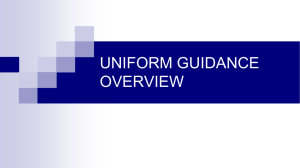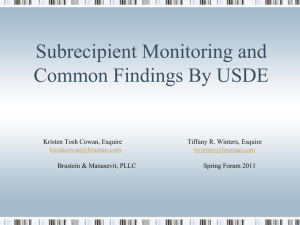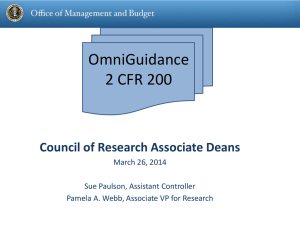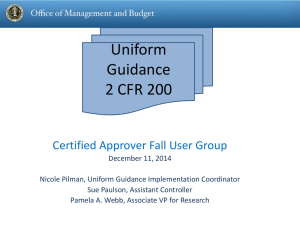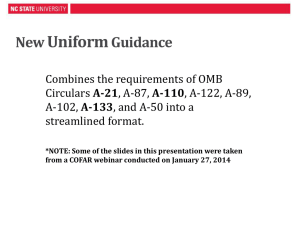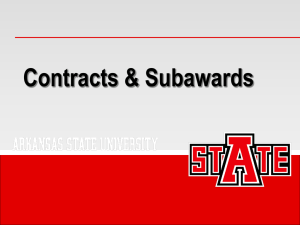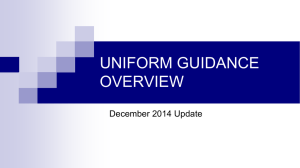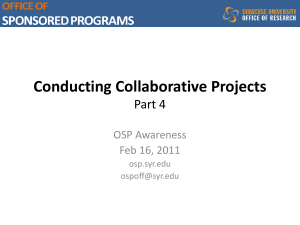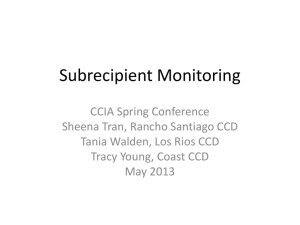Subawards Administration
advertisement
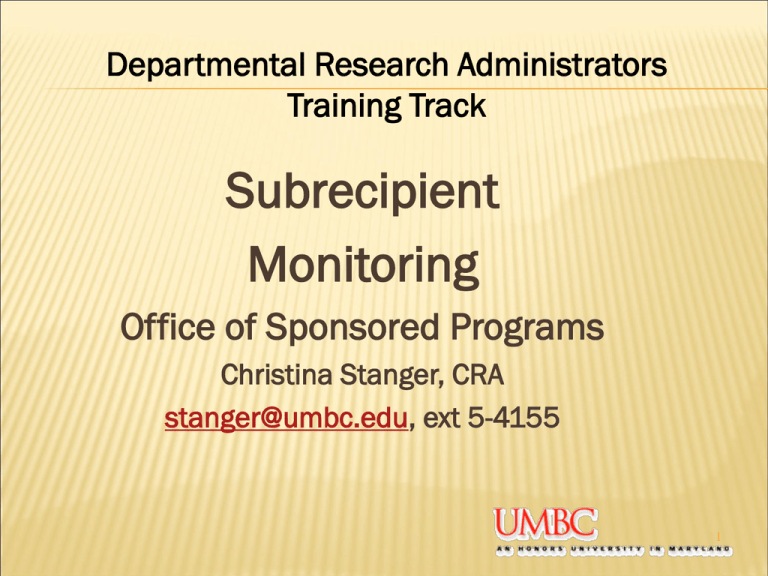
Departmental Research Administrators Training Track Subrecipient Monitoring Office of Sponsored Programs Christina Stanger, CRA stanger@umbc.edu, ext 5-4155 1 Course Overview Module I: Intro, Definitions, & Workflow Module II: UMBC Policies & Federal Compliance Issues Helpful Websites 2 Module I: Definitions OMB A-110 (2 CFR Part 215) Definition: Subaward means an award of financial assistance in the form of money, or property in lieu of money, made under an award by a recipient to an eligible subrecipient or by a subrecipient to a lower tier subrecipient. The term includes financial assistance when provided by any legal agreement, even if the agreement is called a contract, but does not include procurement of goods and services nor does it include any form of assistance which is excluded from the definition of "award" in paragraph (e)…(“e” is from A110’s definition of an award). Subrecipient means the legal entity to which a subaward is made and which is accountable to the recipient for the use of the funds provided. The term may include foreign or international organizations (such as agencies of the United Nations) at the discretion of the Federal awarding agency. Module I: Definitions UMBC Definition: A subaward issued by UMBC refers to an agreement between UMBC and any other organization in which a Principal Investigator (PI) at the other organization will assist UMBC in accomplishing an externally-funded project by performing substantive work on the project. Substantive work is effort in which the collaborator engages directly in the performance of the specific aims of the project. UMBC and the subrecipient mutually agree on how the substantive work will be performed and how it will be measured. The subaward will have a PI and will generally have potentially patentable or copyrightable technology and/or publications resulting from the project. A subaward does not include agreements for the procurement or purchase of routine goods or services. Module I: Definitions Subaward Refers to an agreement in which grant terms and conditions are being flown down to the subrecipient Subcontract Refers to an agreement in which contract terms and conditions are being flown down to the subcontractor Modifications (Mods)/ Amendments Refers to official changes to the terms & conditions of the initial subaward/subcontract Module I: When to Subaward Appropriate Use of Subawards the scope of work to be performed utilizes the facilities, employees and/or resources of a subrecipient; the subrecipient is contributing substantively to the scholarly and/or scientific conduct of the project as described in the scope of work and has responsibility for programmatic decision making; the subrecipient has responsibility for adherence to applicable federal program compliance and performance and is measured against whether the objectives of the federal program are met; the subrecipient will bring a unique knowledge and expertise to the project and conduct the work mostly independent of UMBC’s direct supervision or control with only general technical direction and coordination exercised by the UMBC PI; and the subrecipient, as part of its primary business operations, does not provide the same goods and services to others and will be using the subaward funds to carry out a program of the subrecipient organization rather than provide goods and services to complete a program for the sole benefit of UMBC (e.g. purchase, fabrication or repair of equipment, data processing, routine analytical or testing services). Module I: When to Subaward Inappropriate Use of a Subaward if the agreement is for the provision of goods or services within normal business operations; if the organization/business provides similar goods or services to many different purchasers; if the organization/business operates in a competitive environment for the provisioning of the goods or services to be procured; if providing goods or services are ancillary to the operation of the funding agency; or if the organization/business is not subject to the requirements of the funding agency. When a subaward is not appropriate, the PI/department should check with the Procurement Department for information on how to purchase the goods or services. Note, F&A is charged on only the first $25,000 of a subcontract but on the entire amount of a vendor contractual arrangement. Module I: Pass-Through Entity Relationship Prime Sponsor (Federal Agency, State Agency, Contractor, etc..) Prime Awardee (UMBC) Subrecipient 1 Subrecipient 2 Sub-Tier Subrecipient A Sub-Tier Subrecipient B Subrecipient 3 Module I: Pass-Through Entity Relationship Privity of contract exists between UMBC & any subrecipient, meaning the subrecipient should always contact UMBC for request and prior approvals (never the prime sponsor). Privity exists between the prime sponsor and the prime awardee (UMBC), and privity exists between the prime awardee (UMBC) and the subrecipient. There is no privity between the prime sponsor and the subrecipient The subrecipient has no legal recourse against the prime federal sponsor The prime awardee (UMBC) would be ultimately responsible in the eyes of the federal government for the performance of the subrecipeint. All proposed cost sharing or unallowable costs generated by the subrecipient is the responsibility of the prime awardee (UMBC). Subrecipients are, however, subject to federal audits due to the relationship established by a subaward from the prime awardee (UMBC). It is up to UMBC to ensure the subrecipient is in compliance with federal regulations. Federal sponsors will recoup any cost sharing or unallowable costs through the prime awardee (UMBC). Module I: Workflow for a New Subrecipient OSP receives primary grant with subaward pre-approval OSP contacts UMBC PI to verify collaboration, dates, amounts, etc… Changes from Original Proposal? yes PI/Bus. Mgr. provides OSP with revised Budget/SOW/Etc.. no OSP drafts subagreement with specific flow-down T&C Bus. Mgr. submits a purchase request & forwards the PR # to OSP OSP collects subrecipient compliance data & certifications OSP contacts Procurement for the PO #, which becomes the subaward # OSP sends draft agreement to PI for review & approval PI reviews & sends approval to OSP OSP partially executes & sends to subrecipient AO Subrecipient begins work & invoices against PO OSP receives fully executed subagreement & send to PI/Bus. Mgr. Module I: Workflow for Modifications OSP receives primary grant/contract amendment OSP contacts UMBC PI to verify sustainability & get approval for subaward mod Revisions to Original T&C? yes OSP drafts mod with revisions & gets PI approval no OSP drafts modification OSP verifies annual certifications or retrieves them OSP forwards executed mod to PI & Bus. Mgr. OSP receives fully executed mod from subrecipient OSP partially executes mod & sends to subrecipient for signature Bus. Mgr. ensures PO change request is submitted to & processed by Procurement Subrecipient continues work & invoicing according to mod Module I: Workflow for Invoice Payment OSP receives the subaward invoice from Accounts Payable OSP conducts a 2-person review via the subaward checklist yes Problems? OSP contacts the subaward financial contact or UMBC dept no Bus. Mgr. ensures a receipt is entered into PeopleSoft for invoice payment PI & Bus. Mgr. review invoice & verify expenses match project progress AP reviews, approves & sends payment request to the State State reviews [30 days] & verifies subrecipient does not owe State for any reason OSP forwards the invoice to the PI & Bus. Mgr., notating any issues/resolutions Subrecipient is paid amount of invoice -sometimes minus outstanding State debt OSP gets a resolution to the invoice problem Module I: Workflow for Close Out Prime award ends, subaward ends, or PI terminates subaward PI notifies OSP of termination or vice versa PI request final technical report From subrecipient OSP contacts Subrecipient and request property & patent/invention reports Subrecipient submits reports Subrecipient reports are used to close out UMBC prime award Module II: Policies & Compliance Subrecipients must follow all of these laws/regulations/policies Federal Regulations Refers to OMB’s/CFR’s; Federal Law Federal Agency Policies Refers to Specific Agency Requirements UMBC Policies / Terms & Conditions Subrecipient Institute’s Policies Module II: Policies & Compliance We Flow Down: Module II: Policies & Compliance We Flow Down: OMB A-21 (2 CFR Part 220) Cost Principles for Educational Institutions (Allowable, Allocable, Reasonable & Consistently-Treated Expenses) OMB A-110 (2 CFR Part 215) Uniform Administrative Requirements for Grants & Agreements with Institutions of Higher Education, Hospitals, and Other Non-Profit (Management & Monitoring of Federal Funds; Also sets forth consistency & uniformity among Fed Agencies for administration of grants & contracts to institutions of higher education) Module II: Policies & Compliance We Flow Down: OMB A-133 Audits of States, Local Governments, and Non-Profit Organizations Title 34 CFR (§ 84.630) Debarment means an action taken by a Federal agency to prohibit a recipient from participating in Federal Government procurement contracts and covered nonprocurement transactions. A recipient so prohibited is debarred, in accordance with the Federal Acquisition Regulation for procurement contracts (48 CFR part 9, subpart 9.4) and the common rule, Government-wide Debarment and Suspension (Nonprocurement), that implements Executive Order 12549 and Executive Order 12689. Module II: Policies & Compliance We Flow Down: Federal Funding Accountability & Transparency Act of 2006 (FFATA) -18 month delay for subrecipients American Recovery & Reinvestment Act (ARRA) - Subawards are subjected to ARRA reporting - Reporting is due no later than 5 days after each calendar quarter for subawards Module II: Policies & Compliance Federal Compliance Issues - Proper monitoring of subrecipient spending - Certifications for cost sharing & compliance UMBC Subaward Policies & Procedures - Defines use of subrecipient agreements - Defines monitoring responsibility - Provides general procedures Module II: Policies & Compliance Subrecipient Monitoring PI & Department Responsibility verifying that work performed by the subrecipient is conducted in a timely manner and is acceptable; reviewing and approving subrecipient invoices (to be forwarded by OSP); Verify salary, expenses, & effort = work being produced! maintaining regular contact with the subrecipient regarding the technical aspects of the project; performing site visits as necessary to review fiscal and programmatic records and/or observe programmatic activities; and ensuring that all deliverables (e.g. technical, property, and invention reports) required under the subaward are being provided. Module II: Policies & Compliance Subrecipient Monitoring OSP Responsibility informing each subrecipient of the CFDA title and number, award name and number, and name of the federal agency providing funding; advising subrecipients of the requirements imposed on them by federal laws, regulations, the provisions of the prime award, or provisions of UMBC; ensuring that non-profit subrecipients expending $500,000 or more in federal awards during the subrecipient’s fiscal year have met the audit requirements of OMB Circular A-133; issuing a management decision (when subrecipients have A-133 audit findings) within six months after receipt of the subrecipient’s audit report and ensuring that the subrecipient takes appropriate and timely corrective action; considering whether subrecipient audits necessitate adjustment of UMBC’s own records; Module II: Policies & Compliance Subrecipient Monitoring OSP Responsibility (Continued) requiring each subrecipient to permit UMBC and auditors to have access to the records and financial statements as necessary for audit purposes; reviewing and approving subrecipient invoices and forwarding them to the PI for review and approval; and verifying cost sharing commitment is documented and certified by subrecipient verifying the subrecipient has not been debarred or suspended from receiving federal funds verifying the subrecipient has an IRB or IACUC approved research protocol performing desk audits and/or site visits as necessary for review of subrecipient financial records; and obtaining a Small Business Subcontracting Plan from the subrecipient if a subaward is on a federal contract incorporating the Small Business Subcontracting Plan requirement, the amount of the subaward is $550,000 or more AND the subrecipient is not a small business. Module II: Policies & Compliance What happens if we don’t comply? UMBC NSF Audit 2006 Finding: Inadequate subrecipient monitoring of costs Finding: Inadequate monitoring of subrecipient costsharing Action: Audited UMBC subrecipients Resolution: UMBC charged with developing a comprehensive subrecipient fiscal monitoring plan, including reviewing cost sharing data and supporting cost documentation from its subrecipients on a regular basis Module II: Policies & Compliance What happens if we don’t comply? HHS Audit of Yale subaward to U Mass Medical School Major signal about the responsibility to monitor subrecipients Disallowed $194K of a $572K award Disallowed cost transfers, effort, cost allocation methodology Useful Websites OSP http://www.umbc.edu/research/OSP/ Excluded Parties List https://www.epls.gov/ Harvester http://harvester.census.gov/sac/ FFATA http://www.ffata.org/ffata/ FDP http://www.thefdp.org/ MD State Vendor Payments https://interactive.marylandtaxes.com/extranet/gad/ GADLogin/login.asp Query for viewing invoice pymts in PS: UM_AP_VCHRS_BY_PROJECT_PD Questions? References UMBC Subrecipient Policy & Procedures Univ. of Minnesota “Dirty Deeds” presentation Univ. of Mississippi Subrecipient Policy Management Concepts course “Subawarding for Pass-Through Entities”
